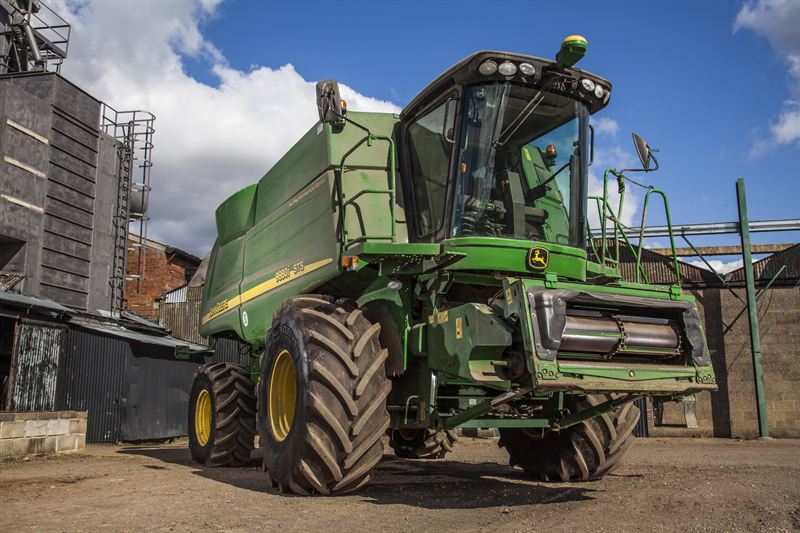CHECK YOUR TYRES FOR A RELIABLE HARVEST, URGES MICHELIN’S TECHNICAL MANAGER

Stoke-on-Trent – June 24, 2015
Michelin’s Technical Manager, Gordon Brookes is urging farmers to prepare for a smooth-running harvest and shares his top 10 tips for effective tyre and wheel management.
“Time, weather and crop constraints make it essential that machinery is ready for use and leaving checks until the last minute can result in unexpected machine downtime,” explains Brookes, who has 28 years’ experience at Michelin under his belt.
1. Check your combine’s tyres for damage
During previous harvests tyres may have suffered accidental damage, leaving them with bulges, cuts or tears. Checking the tread area and sidewalls right down to the wheel trim now guarantees that any problems can be detected as soon as possible. Leaving damage unchecked can result in costly tyre failure and harvest interruptions.
2. Check for flat spots
Long periods of inactivity can leave tyres with a ‘flat spot’ due to one section of the casing being deflected, creating massive vibrations on the road. To combat this, mark the affected area of the tyres, move the combine into direct sunlight with other sections of the tyres deflected. If possible - inflate the tyres above your standard operating pressure for a couple of hours, whilst ensuring the manufacturer’s maximum inflation pressure is not exceeded. Warming the tyres in the sunlight will prompt the casing to return to its normal shape.
3. Check your tyre pressures
Ensure that tyres are inflated to the correct pressure in readiness for harvest, considering maximum cyclic load in the field and whether the combine will be used on side slopes or intensively on the roads.
4. Tyre choice
If you need new tyres, or a new machine, take tyre choice seriously. Tyre choice can make the difference between a good harvest and a great one and for most combines and foragers there is now a tyre that contains Ultraflex Technology, which limits soil compaction and disturbance on headlands whilst offering greater operator comfort, manoeuvrability and load capacity.
5. Transport width
Is your combine too wide for the road or gateways and would a narrower tyre speed up the harvesting process? If so, there are now tyres for combines that are narrower but have a greater contact with the ground. For example, a Michelin 900/60 R32 conventional tyre assembly could be replaced by a Michelin IF 800/70 R32 assembly, giving a 15 per cent larger footprint whilst making the combine 200mm narrower.
6. Rear tyres
Rear tyres can affect the efficiency of the combine but are more commonly neglected. Rear tyres should be operated appropriately in line with manufacturer recommendations. Farmers often don’t always realise that many of these tyres are designed for industrial machinery and require very high pressures which can cause damage on headlands. It’s therefore important to allocate the same time specifying rear tyres as you would the front set.
7. Regular tyre inspections
Daily tyre inspections can often be overlooked but are essential in prolonging tyre life and machine availability. Spotting cuts and tears as they appear helps ensure they can be repaired in a timely manner and limits machine downtime.
8. Watch those wheels
To prolong tyre life, wheels need to be kept in tip-top condition too. Kerbing or hitting a pothole can affect a machine’s wheel alignment, leading to rapid and uneven wear on the rubber.
9. Putting the brakes on
It’s common sense advice that accelerating slowly and braking progressively maximises tyre life. Easing off the brakes and making a conscious effort to accelerate gently can pay dividends in keeping rubber in service for longer.
10. Other tyres are just as important
Make sure that all machinery involved in the harvest is in excellent condition and tyres inflated to the correct pressure, not just the harvester itself. Consider grain carting as an example – is the road work intensive? If so, the tractor and trailer tyres need to be inflated accordingly to reflect this intensive operation.
Concluding, Brookes says: “Don’t be afraid to ask for expert tyre advice, it is a free service. The worst possible time to suffer tyre-related downtime is during the busy harvest period, so it really pays to ensure your machines are set up perfectly and ready to roll in advance.”
Farmers can seek expert tyre support through their local Michelin Exelagri dealer; a network of more than 40 dealerships in the UK and Ireland which offer a range of services including expert advice on tyre specification, guaranteed emergency repairs – even during periods of intense farming activity – and geometry to achieve the right set-up on even the most complex agricultural machinery.
Michelin also operates the largest team of dedicated account managers in the agricultural sector, who are on hand to visit customers.
For a full list of Michelin’s Exelagri dealers visit www.michelin-agricultural-tyres.co.uk. You can also tweet @MichelinAgriUK for more information.
ends
Michelin, the leading tyre company, is dedicated to sustainably improving the mobility of goods and people by manufacturing, distributing and marketing tyres for every type of vehicle. It also offers innovative business support services, digital mobility services and publishes travel guides, hotel and restaurant guides, maps and road atlases. Headquartered in Clermont-Ferrand, France, Michelin is present in 170 countries, has 112,300 employees and operates 68 production plants in 17 countries. The Group also has a Technology Centre, responsible for research and development, with operations in Europe, North America and Asia. (www.michelin.com)
For further press information please contact:
David Johnson, Michelin Press Office
Tel: + 44 (0) 1782 402341 Email: d.johnson@uk.michelin.com
James Keeler or Beth Laws, Garnett Keeler PR, Inver House, 37-39 Pound Street,
Carshalton, Surrey, SM5 3PG
Tel: +44 (0)20 8647 4467 Fax: +44 (0)20 8544 4711 E-mail: james.keeler@garnettkeeler.com or beth.laws@garnettkeeler.com
MICHA/130/15
Tags:



